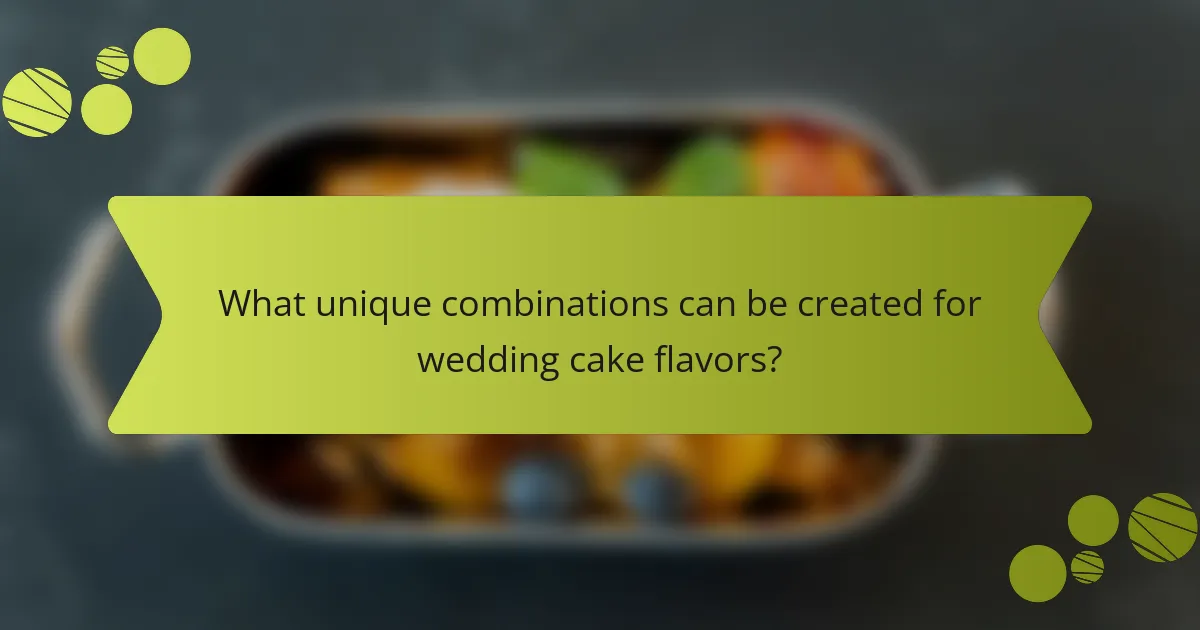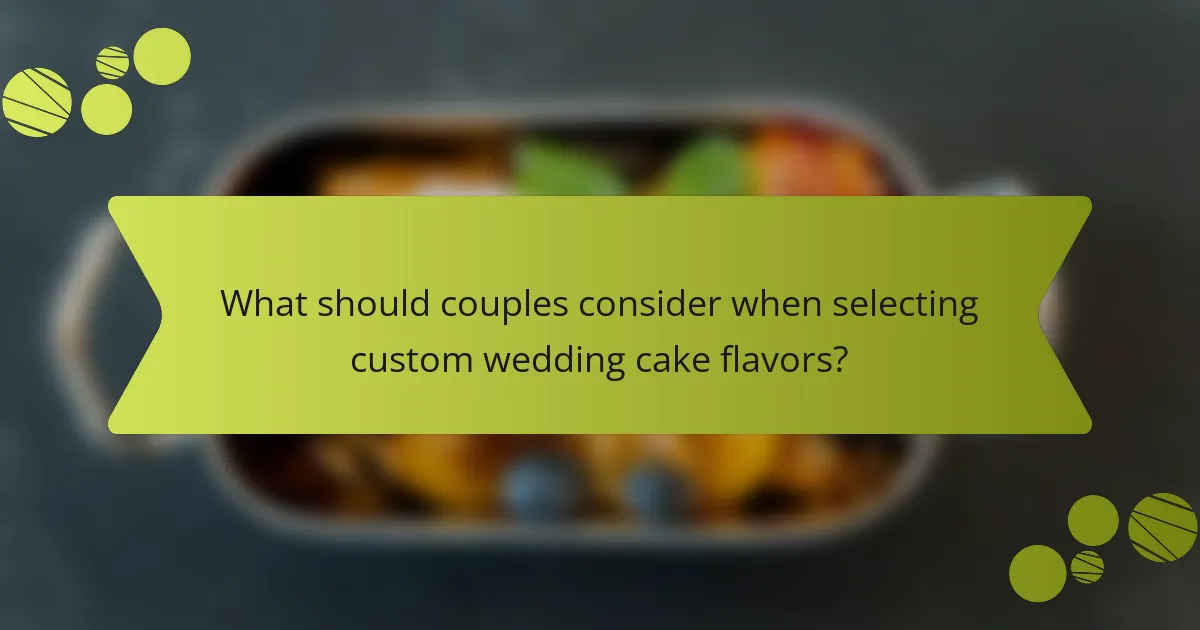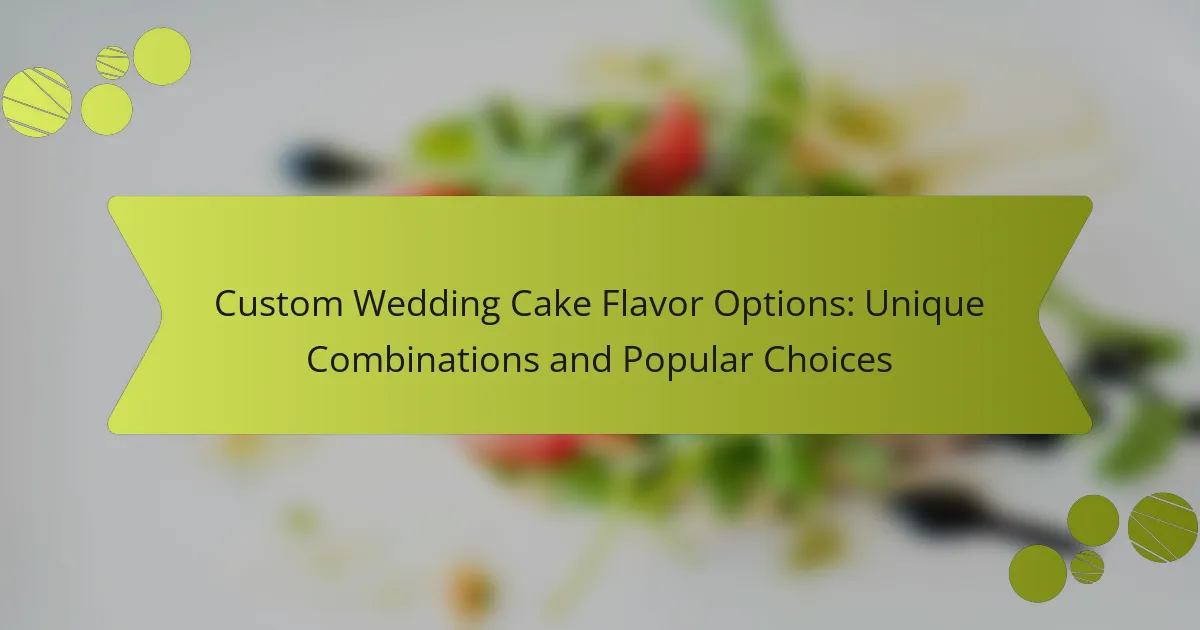Custom wedding cake flavor options provide a diverse range of choices tailored to individual preferences. Popular flavors include classic vanilla, rich chocolate, and moist red velvet, while unique combinations feature lavender lemon, chocolate raspberry, and almond vanilla. Couples can customize their cakes with various fillings, such as chocolate ganache and cream cheese frosting, and consider dietary needs with gluten-free or vegan options. Seasonal ingredients can enhance flavor profiles, and sampling multiple flavors from a baker ensures delicious selections that reflect the couple’s tastes and wedding theme.

What are Custom Wedding Cake Flavor Options?
Custom wedding cake flavor options include a wide variety of choices tailored to individual preferences. Popular flavors often feature classic vanilla, rich chocolate, and moist red velvet. Unique combinations can include lemon raspberry, almond amaretto, or coconut cream. Seasonal flavors like pumpkin spice or strawberry shortcake are also popular. Customization allows for fillings such as chocolate ganache, fruit preserves, or cream cheese frosting. Couples can also choose to mix flavors across different tiers of the cake. Specialty options like gluten-free or vegan flavors are available for dietary needs. These choices enable couples to create a personalized cake that reflects their tastes and wedding theme.
How do custom wedding cake flavors enhance the wedding experience?
Custom wedding cake flavors enhance the wedding experience by personalizing the celebration. They reflect the couple’s tastes and preferences, making the event more memorable. Unique flavors can surprise and delight guests, creating a lasting impression. For example, a lavender-infused cake offers a distinct experience compared to traditional vanilla. Custom flavors can also align with the wedding theme or season, adding to the overall aesthetic. This personalization fosters emotional connections among guests. Additionally, unique flavors can spark conversations, enhancing social interactions during the reception. Overall, custom flavors elevate the significance of the wedding cake as a centerpiece.
What factors influence the choice of cake flavor for weddings?
The choice of cake flavor for weddings is influenced by personal preferences, cultural traditions, and seasonal availability. Personal tastes of the couple play a significant role in flavor selection. Popular flavors include vanilla, chocolate, and red velvet, reflecting common preferences. Cultural influences can dictate specific flavors tied to heritage or family traditions. Seasonal ingredients also impact flavor choices, with fresh fruits and spices often preferred in certain months. Additionally, guest preferences may guide the couple to select universally liked flavors. Lastly, the wedding theme can influence flavor choices, aligning the cake with overall decor and ambiance.
How do personal preferences shape custom cake flavor options?
Personal preferences significantly influence custom cake flavor options. Individuals often choose flavors based on taste, cultural background, and dietary restrictions. For instance, some may prefer classic flavors like vanilla or chocolate, while others may opt for unique combinations like lavender or matcha. Seasonal ingredients also affect choices, with fresh fruits being popular in summer weddings. Additionally, personal experiences and memories can guide flavor selections, such as a couple’s favorite dessert. Ultimately, the customization process allows for a reflection of the couple’s identity and values. This trend is supported by the growing popularity of personalized wedding cakes, as noted by the WeddingWire 2022 Newlywed Report, which highlights that 63% of couples prioritize unique flavors.
What are the most popular wedding cake flavors?
The most popular wedding cake flavors include vanilla, chocolate, and red velvet. Vanilla is favored for its classic taste and versatility. Chocolate provides a rich and indulgent option for guests. Red velvet, known for its striking color and cream cheese frosting, is also a favorite. Other trending flavors include lemon, almond, and carrot cake. According to a survey conducted by The Knot, vanilla and chocolate consistently rank at the top of wedding cake flavor preferences. These flavors appeal to a wide range of palates, making them ideal for celebrations.
Which traditional flavors are commonly chosen for weddings?
Traditional flavors commonly chosen for weddings include vanilla, chocolate, and red velvet. Vanilla is a classic choice known for its versatility and broad appeal. Chocolate offers a rich flavor that many guests enjoy. Red velvet is popular for its unique color and mild cocoa taste. Other traditional options may include lemon and almond. These flavors have been favored in wedding cakes for decades. Their popularity is supported by their ability to complement various fillings and frostings.
What modern flavor trends are emerging in wedding cakes?
Modern flavor trends emerging in wedding cakes include unique combinations and bold flavors. Popular choices now feature floral, herbal, and spice elements. Flavors such as lavender, rosemary, and cardamom are increasingly sought after. Additionally, couples are opting for unconventional pairings like lemon and basil or chocolate and chili. There is also a rise in the use of alternative sweeteners and gluten-free options. According to a survey by The Knot, 30% of couples choose non-traditional flavors for their wedding cakes. This trend reflects a desire for personalization and creativity in wedding celebrations.

What unique combinations can be created for wedding cake flavors?
Unique combinations for wedding cake flavors include lavender lemon, chocolate raspberry, and almond vanilla. Lavender lemon combines floral notes with citrus zest. Chocolate raspberry offers a rich chocolate base paired with tart raspberry filling. Almond vanilla blends nutty almond flavor with classic vanilla for a unique twist. Other combinations like carrot spice with cream cheese frosting and red velvet with cream cheese filling are also popular. These flavors provide distinctive tastes that cater to various preferences.
How can couples customize their wedding cake flavors?
Couples can customize their wedding cake flavors by selecting unique combinations that reflect their tastes. They can choose from a variety of cake bases, such as vanilla, chocolate, or red velvet. Each base can be paired with different fillings, including fruit preserves, chocolate ganache, or cream cheese. Couples may also opt for flavored frostings, like lemon or almond, to enhance the overall taste. Additionally, they can incorporate personal touches, such as family recipes or cultural flavors. Some bakers offer tasting sessions to help couples decide on their preferred combinations. This customization process allows couples to create a cake that is uniquely theirs.
What are some creative flavor pairings for wedding cakes?
Creative flavor pairings for wedding cakes include combinations like lemon and lavender, chocolate and raspberry, and vanilla and almond. Lemon and lavender provide a refreshing taste profile, balancing tartness with floral notes. Chocolate and raspberry offer a rich, indulgent experience, perfect for chocolate lovers. Vanilla and almond create a classic yet unique flavor, enhancing the richness of the cake. Other pairings include carrot and pineapple, which add moisture and sweetness, and red velvet with cream cheese, delivering a rich flavor contrast. These combinations cater to diverse palates and enhance the overall wedding cake experience.
How do seasonal ingredients influence unique flavor combinations?
Seasonal ingredients significantly influence unique flavor combinations by introducing fresh, vibrant tastes that reflect the time of year. For example, summer fruits like strawberries and peaches offer sweetness and acidity, enhancing cake flavors. In contrast, winter ingredients like spices and citrus provide warmth and depth.
Using seasonal ingredients allows for creativity in pairing flavors that complement each other. Seasonal availability ensures ingredients are at their peak freshness, enhancing overall taste. This approach also connects the cake to the season, making it more memorable for weddings.
Studies show that seasonal eating can improve flavor perception and overall satisfaction. A survey by the National Restaurant Association found that 70% of chefs believe seasonal ingredients enhance menu items. Thus, incorporating seasonal ingredients into wedding cakes creates unique and delightful flavor combinations.
Why is it important to consider dietary restrictions in flavor choices?
Considering dietary restrictions in flavor choices is crucial to ensure inclusivity and safety for all guests. Dietary restrictions can stem from allergies, intolerances, or specific dietary lifestyles. For instance, gluten-free options are essential for individuals with celiac disease. A study published in the Journal of Allergy and Clinical Immunology indicates that food allergies affect approximately 8% of children and 4% of adults. Additionally, accommodating vegan or vegetarian diets can enhance guest satisfaction. Ignoring these restrictions may lead to negative experiences or health risks for affected individuals. Therefore, thoughtful flavor choices can cater to diverse needs and promote a positive event atmosphere.
What are some popular gluten-free wedding cake flavor options?
Popular gluten-free wedding cake flavor options include vanilla, chocolate, and lemon. These flavors are widely favored for their versatility and appeal. Almond and red velvet are also popular choices among couples seeking gluten-free options. Carrot cake offers a unique twist and is often well-received. Each of these flavors can be enhanced with gluten-free frosting and fillings. Many bakeries specialize in gluten-free recipes to ensure taste and texture meet expectations. This variety allows couples to personalize their wedding cake while accommodating dietary restrictions.
How can vegan options be incorporated into custom wedding cakes?
Vegan options can be incorporated into custom wedding cakes by using plant-based ingredients. Traditional dairy and eggs can be replaced with alternatives like almond milk, coconut milk, or soy milk. For binding, ingredients such as flaxseed meal or applesauce can serve as substitutes for eggs.
Vegan butter or coconut oil can replace regular butter for a rich texture. Flour options like almond flour or whole wheat flour can be used to create the cake base. Additionally, natural sweeteners such as maple syrup or agave nectar can enhance flavor without animal products.
Many bakeries now offer vegan cake recipes, ensuring taste and texture are not compromised. Research shows that plant-based diets are becoming increasingly popular, with a 300% increase in veganism in the last decade. This trend supports the demand for vegan wedding cake options.

What should couples consider when selecting custom wedding cake flavors?
Couples should consider their personal taste preferences when selecting custom wedding cake flavors. This includes choosing flavors that they both enjoy and that reflect their personalities. They should also think about the theme of their wedding. Certain flavors may complement the overall aesthetic and ambiance. Dietary restrictions of guests are another important factor. Couples should consider options for gluten-free or vegan guests. Seasonal ingredients can enhance flavor and freshness. Using fruits or spices that are in season can create a delightful experience. Lastly, they should sample a variety of flavors from their baker. This ensures the chosen flavors are not only appealing but also delicious.
How can the wedding theme influence flavor selection?
The wedding theme significantly influences flavor selection for the cake. A rustic theme may lead to the choice of flavors like vanilla bean or carrot cake, which evoke comfort and warmth. A beach theme often favors tropical flavors such as coconut or pineapple, aligning with the seaside atmosphere. Formal themes typically encourage sophisticated flavors like chocolate ganache or red velvet, reflecting elegance. Seasonal themes also play a role; for instance, autumn themes might incorporate pumpkin spice or apple cinnamon. The chosen theme helps guide the overall taste experience, ensuring the cake complements the wedding’s aesthetic and ambiance.
What role does the cake’s design play in flavor choice?
The cake’s design significantly influences flavor choice. A visually appealing design can evoke specific flavor expectations. For example, a floral design may suggest fruity or floral flavors. Conversely, a rich chocolate design often leads to a preference for chocolate-based flavors. Color schemes can also guide flavor perceptions; pastel colors might indicate lighter, sweeter flavors. Additionally, thematic designs can align with cultural or seasonal flavors. According to a study by the American Baking Association, 70% of consumers associate cake aesthetics with flavor expectations. Therefore, the design not only enhances visual appeal but also shapes flavor decisions.
How can flavor testing help in making the final decision?
Flavor testing is essential in making the final decision for wedding cake options. It allows couples to sample different flavors and combinations. This process helps identify personal preferences and ensures satisfaction. Flavor testing also highlights potential pairings that complement each other. Additionally, it provides an opportunity to assess texture and overall appeal. Engaging in this practice can prevent disappointment on the wedding day. Research shows that sensory evaluation significantly impacts food choices. A study published in the Journal of Sensory Studies confirms that taste testing influences consumer satisfaction.
What tips can help in choosing the perfect wedding cake flavors?
Consider your personal taste preferences when choosing wedding cake flavors. Start by discussing flavors you both enjoy. Explore popular combinations such as vanilla and chocolate or lemon and raspberry. Incorporate seasonal ingredients for freshness and relevance. Sample different flavors during cake tastings to evaluate texture and taste. Consider the theme of your wedding to ensure flavors align with the overall aesthetic. Consult with a professional baker for expert recommendations based on current trends. Lastly, think about your guests’ preferences to ensure a variety of options.
How can couples balance flavor variety with guest preferences?
Couples can balance flavor variety with guest preferences by conducting a survey of their guests’ favorite flavors. This approach ensures that popular choices are included in the cake design. Couples should also consider offering a tiered cake with different flavors for each layer. This method provides variety while catering to diverse tastes. Additionally, incorporating a mix of classic and unique flavors can appeal to a broader audience. For example, combining chocolate, vanilla, and lemon can satisfy traditional preferences while introducing creativity. This strategy allows couples to create a memorable cake that reflects their style and guests’ likes.
What are some common mistakes to avoid when selecting cake flavors?
Common mistakes to avoid when selecting cake flavors include overlooking guest preferences. Ignoring dietary restrictions can lead to dissatisfaction. Another mistake is not considering the season; flavors should complement the weather. Failing to balance flavors, such as choosing overly sweet options, can overwhelm the palate. Additionally, sticking to only traditional flavors may limit creativity. Lastly, neglecting to sample the cake beforehand can result in unexpected outcomes. These practices ensure a more enjoyable cake experience for everyone involved.
Custom wedding cake flavor options encompass a diverse range of choices, including classic flavors like vanilla, chocolate, and red velvet, as well as unique combinations such as lemon raspberry and lavender lemon. The article explores how these custom flavors enhance the wedding experience by reflecting the couple’s tastes and accommodating dietary restrictions, including gluten-free and vegan options. It also discusses factors influencing flavor selection, such as personal preferences, cultural traditions, and seasonal ingredients, while highlighting popular trends and creative pairings. Ultimately, the content provides insights into how couples can personalize their wedding cakes to create memorable experiences for themselves and their guests.
